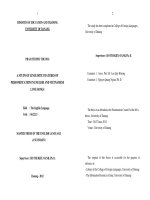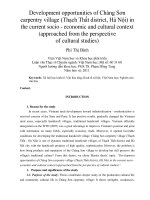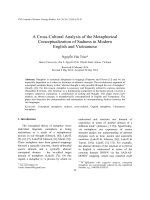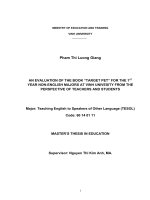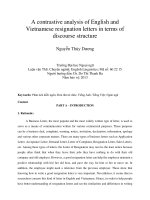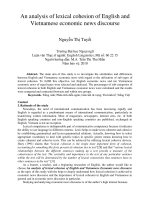An attitudinal analysis of english and vietnamese love songs from the perspective of appraisal th
Bạn đang xem bản rút gọn của tài liệu. Xem và tải ngay bản đầy đủ của tài liệu tại đây (1.71 MB, 111 trang )
THE UNIVERSITY OF DANANG
UNIVERSITY OF FOREIGN LANGUAGE STUDIES
NGUYỄN HUỲNH DIỄM MY
AN ATTITUDINAL ANALYSIS OF
ENGLISH AND VIETNAMESE LOVE SONGS FROM
THE PERSPECTIVE OF APPRAISAL THEORY
Major: ENGLISH LINGUISTICS
Code: 822.02.01
MASTER THESIS IN
LINGUISTICS AND CULTURAL STUDIES
OF FOREIGN COUNTRIES
Da Nang, 2020
THE UNIVERSITY OF DANANG
UNIVERSITY OF FOREIGN LANGUAGE STUDIES
NGUYỄN HUỲNH DIỄM MY
AN ATTITUDINAL ANALYSIS OF
ENGLISH AND VIETNAMESE LOVE SONGS FROM
THE PERSPECTIVE OF APPRAISAL THEORY
Major: ENGLISH LINGUISTICS
Code: 822.02.01
MASTER THESIS IN
LINGUISTICS AND CULTURAL STUDIES
OF FOREIGN COUNTRIES
SUPERVISOR: NGŨ THIỆN HÙNG, Ph. D
Da Nang, 2020
i
STATEMENT OF AUTHORSHIP
I hereby certify this thesis “An Attitudinal Analysis of English and Vietnamese
Love Songs from the Perspective of Appraisal Theory” is my own work. No other
person’s work has been used without the acknowledgement in the thesis.
This paper has not been submitted for the award of any degree or diploma in
any other tertiary institution.
Da Nang, 2020
Nguyễn Huỳnh Diễm My
ii
ABSTRACT
The present study examined two sub-categories of Attitude, Affect and
Judgement, in lyrics of English and Vietnamese love songs in the light of Appraisal
Theory. The study aimed to investigate the semantic values and syntactic
realizations of Attitude sub-categories from 50 English love songs and 50
Vietnamese ones. This descriptive study employed the qualitative method to
describe and interpret the data of the sub-categories of Affect and Judgement in
terms of semantics and syntax. In addition, quantitative method was also applied to
show the distributions and occurrences of instances of Affect and Judgement in
English and Vietnamese love songs’ lyrics by some statistical tables. The findings
of the research revealed that the two sub-categories of Attitude could be recognized
in various groups and phrase. Moreover, the study worked out typical functions of
Affect and Judgement as components in Mental and Behavioural processes.
Semantically, the findings showed that all Appraisal evaluating values were
reflected in English and Vietnamese love songs. The study also put forward some
implications to comprehending of the sub-categories of Attitude in the love songs
and provided the teachers and university students majoring in English with practical
implications to evaluate a discourse fragment and interpret a discourse fragment in
the light of Appraisal Theory and in line with Systemic Functional Linguistics.
iii
TABLE OF CONTENTS
Statement Of Authorship ......................................................................................... i
Abstract ..................................................................................................................... ii
Table Of Contents ................................................................................................... iii
List Of Abbreviations ............................................................................................. vi
List Of Tables ........................................................................................................ viii
List Of Figures ......................................................................................................... ix
List Of Charts .......................................................................................................... xi
Chapter One. INTRODUCTION ............................................................................1
1.1. RATIONALE ...................................................................................................1
1.2. AIMS AND OBJECTIVES .............................................................................4
1.2.1. Aims .........................................................................................................4
1.2.2. Objectives .................................................................................................4
1.3. RESEARCH QUESTIONS .............................................................................4
1.4. SCOPE OF STUDY.........................................................................................5
1.5. SIGNIFICANCE OF THE STUDY ................................................................6
1.6. ORGANIZATION OF THE STUDY ..............................................................6
Chapter
Two.
LITERATURE
REVIEW
AND
THEORETICAL
BACKGROUND .......................................................................................................7
2.1. REVIEW OF PREVIOUS STUDIES ..............................................................7
2.2. THEORETICAL BACKGROUND ...............................................................11
2.2.1. Appraisal Theory ....................................................................................11
2.2.2. Affect and Judgement as Two Sub-categories of Attitude .....................13
2.2.2.1. The Sub-Category Affect ................................................................14
2.2.2.2. The Sub-Category Judgement .........................................................17
2.2.3. Syntactic Realizations of Affect and Judgement in View of Systemic
Functional Linguistics ......................................................................................20
2.2.4. Love Songs .............................................................................................25
iv
2.3. SUMMARY ...................................................................................................26
Chapter Three. RESEARCH METHODOLOGY ...............................................27
3.1. RESEARCH DESIGN ...................................................................................27
3.2. RESEARCH METHOD ................................................................................27
3.3. DATA COLLECTION ..................................................................................28
3.3.1. Sampling of Study ..................................................................................28
3.3.2. Description of Data.................................................................................29
3.3.3. Instruments of Data Collection ...............................................................30
3.3.4. Procedure of Data Collection .................................................................30
3.4. DATA ANALYSIS........................................................................................30
3.5. RELIABILITY AND VALIDITY .................................................................31
3.6. SUMMARY ...................................................................................................31
Chapter Four. FINDINGS AND DISCUSSION ..................................................32
4.1. SEMANTIC VALUES OF AFFECT IN ENGLISH AND VIETNAMESE
LOVE SONGS ......................................................................................................32
4.1.1. Semantic Values of Affect in English and Vietnamese Love Songs .....32
4.1.1.1. Un/Happiness Meaning of Affect ...................................................33
4.1.1.2. In/Security Meaning of Affect ........................................................37
4.1.1.3. Dis/Satisfaction Meaning of Affect ................................................41
4.1.1.4. Dis/Inclination Meaning of Affect ..................................................45
4.1.2. Semantic Values of Judgement in English and Vietnamese Love Songs
..........................................................................................................................49
4.1.2.1. Social Esteem ..................................................................................49
4.1.2.2. Social Sanction ................................................................................56
4.2. SYNTACTIC REALIZATIONS OF AFFECT AND JUDGEMENT IN
ENGLISH AND VIETNAMESE LOVE SONGS ...............................................60
4.2.1. Affect and Judgement Realized as Nominal Group ...............................60
4.2.2. Affect and Judgement Realized as Verbal Group ..................................70
v
4.2.2.1. Affect Realized as Verbal Group in Mental Process ......................70
4.2.2.2. Affect and Judgement Realized as Verbal Group in Behavioural
Process ..........................................................................................................72
4.2.3. Affect and Judgement Realized as Adverbial Group .............................73
4.2.4. Affect and Judgement Realized as Prepositional Group ........................75
4.3. DISCUSSION ................................................................................................76
4.3.1. Distribution of Affect and Judgement in English and Vietnamese Love
Songs ................................................................................................................76
4.3.1.1. Distribution of Affect in English and Vietnamese Love Songs ......76
4.3.1.2. Distribution of Judgement in English and Vietnamese Love Songs
......................................................................................................................78
4.3.1.3. Distribution of Affect and Judgement in English and Vietnamese
Love Songs ...................................................................................................80
4.3.2. Contrastive Analysis of Affect and Judgement in English and
Vietnamese Love Songs: Similarities and Differences ....................................81
4.4. SUMMARY ...................................................................................................82
Chapter Five. CONCLUSIONS AND IMPLICATIONS ....................................85
5.1. CONCLUSIONS ...........................................................................................84
5.2. IMPLICATIONS ...........................................................................................85
5.2.1. To the Teachers ......................................................................................85
5.2.2. To the Language Learners ......................................................................86
5.3. LIMITATIONS OF THE STUDY ................................................................86
5.4. RECOMMENDATIONS FOR FURTHER RESEARCH .............................87
REFERENCES ........................................................................................................88
APPENDIX ……………………………………………………………………… 93
QUYẾT ĐỊNH GIAO ĐỀ TÀI (bản sao)
vi
LIST OF ABBREVIATIONS
(+)
Positive attitude
(-)
Negative attitude
Cap
Capacity Judgement
Hap
Happiness Affect
Incl
Inclination Affect
Norm
Normality Judgement
PP
Preposition Phrases
Prop
Propriety Judgement
Sat
Satisfaction Affect
Sec
Security Affect
SFG
Systemic Functional Grammar
SFL
Systemic Functional Linguistic
Ten
Tenacity Judgement
Ver
Veracity Judgement
vii
LIST OF TABLES
Number
Name of Tables
Page
2.1
Affect – Un/happiness
14
2.2
Affect – In/security
15
2.3
Affect – Dis/satisfaction
16
2.4
Affect – Dis/inclination
17
2.5
Judgement - Social Esteem
18
2.6
Judgement - Social Sanction
18
2.7
Typical Functions of Group and Phrase Classes
22
4.1
Un/happiness Realizations of Affect in English Songs
34
4.2
Un/happiness Realizations of Affect in Vietnamese Songs
36
4.3
In/security Realizations of Affect in English Songs
38
4.4
In/security Realizations of Affect in Vietnamese Songs
40
4.5
Dis/Satisfaction Realizations of Affect in English Love Songs
42
4.6
Dis/Satisfaction Realizations of Affect in Vietnamese Love
44
Songs
4.7
Dis/Inclination Realizations of Affect in English Love Songs
46
4.8
Dis/Inclination Realizations of Affect in Vietnamese Love
48
Songs
4.9
Normality Realizations of Judgement in Love Songs
51
4.10
Capacity Realizations of Judgement in Love Songs
53
4.11
Tenacity Realizations of Judgement in Love Songs
55
4.12
Veracity Realizations of Judgement in Love Songs
57
4.13
Propriety Realizations of Judgement in Love Songs
59
4.14
Summary Structures of Affect and Judgement as Nominal
68
Groups
4.15
Summary of Syntactic Realizations of Affect and Judgement
76
viii
In English and Vietnamese Love Songs
4.16
Frequency of Semantic Values of Affect in English and
77
Vietnamese Love Songs
4.17
Frequency of Semantic Values of Judgement in English and
78
Vietnamese Love Songs
4.18
Frequency of Semantic Values of Affect and Judgement in both
English and Vietnamese Love Songs
81
ix
LIST OF FIGURES
Number
Name of Figures
Page
2.1
Framework of Appraisal Theory
12
2.2
Components of a Process
22
2.3
Experiential Structure of Part of a Nominal Group
23
2.4
Qualifier in Nominal Group
24
2.5
Pre- modification in the Adverbial Group
24
2.6
Adverbial Group with Embedded Post-modifiers
25
4.1
Affect and Judgement in Experiential Structure of Nominal
61
Group in English: Deictic, Thing
4.2
Affect in Experiential Structure of Nominal Group in
62
Vietnamese: Deictic, Thing
4.3
Affect and Judgement in Experiential Structure of Nominal
62
Group in English: Epithet and Thing
4.4
Affect and Judgement in Experiential Structure of Nominal
63
Group in Vietnamese: Epithet and Thing
4.5
Affect and Judgement in Experiential Structure of Nominal
63
Group in English: Deictic, Epithet and Thing
4.6
Affect and Judgement in Experiential Structure of Nominal
64
Group in Vietnamese: Deictic, Epithet and Thing
4.7
Affect and Judgement in Experiential Structure of Nominal
65
Group in English: Deictic, Epithet, Thing and Prepositional
Phrase
4.8
Affect and Judgement in Experiential Structure of Nominal
66
Group in Vietnamese: Deictic, Epithet, Thing and Prepositional
Phrase
4.9
Affect and Judgement in Experiential Structure of Nominal
67
x
Group in English: Deictic, Epithet, Thing and Finite or Nonfinite Clause
4.10
Affect and Judgement in Experiential Structure of Nominal
68
Group in Vietnamese: Deictic, Epithet, Thing and Finite Clause
4.11
Summary Structures of Affect and Judgement as Prepositional
Groups in English
75
xi
LIST OF CHARTS
Number
Name of Charts
Page
4.1
Percentage of Sub-types of Affect in English and Vietnamese
77
Love Songs
4.2
Percentage of Sub-types of Judgement in English and
79
Vietnamese Love Songs
4.3
Percentage of Affect and Judgement in English Love Songs
80
4.4
Percentage of Affect and Judgement in Vietnamese Love Songs
80
1
Chapter One
INTRODUCTION
1.1. RATIONALE
Language is, and has always been, the most important part of human life and
undoubtedly essential in worldwide communication and integration. As an
international language, English is considered a key to open all doors for
approaching new horizons of knowledge, enhancing mutual understanding across
cultures and integrating worldwide.
“Music is the universal language of mankind.”
Henry Wadsworth Longfellow
This quotation from Longfellow shows how connected language is to music.
Through melodies and lyrics people everywhere in the world share a mutual way of
communicating.
English songs, nowadays, is a very effective tool that should play a larger
role in English learning because it offers a great variety that appeals to learners in a
very entertaining way. People are attracted to songs by the wonderful feelings
conveyed not only via their melody, but also via the beauty of lyrics where the use
of language developed to reach the level of art. In this sense, appraisal analysis of
the attitude meaning in the lyrics of love songs may contribute to the better
understanding of the evaluative aspects of love songs as far as linguistic resources
used in the songs are concerned. Though much has been discussed about evaluative
aspects of different genres such as political discourse, novels, short stories,
commentaries, advertisements of cosmetics, academic reports, little has been
addressed on the evaluative aspects of the lyrics of love songs.
In this study, based on Appraisal theory, the lyrics of love songs will be
analyzed in the perspectives of Appraisal theory. Appraisal theory is an analytical
framework of the language used in expressing the attitude towards something. The
2
theory is divided into three subsystems namely Attitude, Engagement and
Graduation (Martin & White, 2005). Affect deals with people’s emotional states and
reactions to others behaviour and phenomena, while Judgement attends to the
normative assessments of people’s behaviour that we admire or criticize, praise or
condemn. Appreciation are properties, which relates to the things not only we make
and performances but also the phenomenon under evaluation rather than the
participant who does the evaluation.
Let's consider some examples below.
There's a hero
If you look inside your heart
You don't have to be afraid
Of what you are
There's an answer
If you reach into your soul
And the sorrow that you know
Will melt away
And then a hero comes along
With the strength to carry on
And you cast your fears aside
And you know you can survive
So when you feel like hope is gone
Look inside you and be strong
And you'll finally see the truth in you
It's a long road
When you face the world alone
No one reaches out a hand
For you to hold
You can find love
If you search within yourself
3
And the emptiness you felt will disappear…
(Mariah Carey - Hero Lyrics | MetroLyrics)
The phrases that realize the evaluative meaning of Affect – Unhappiness can
be found such as: “sorrow”, “alone”, and “the emptiness”. Another negative aspect
of Affect- Insecurity can be found in the phrases: “fears”. The positive value of
Affect is Security – trust, can be found in phrases “don’t have to be afraid”, and
“the truth”. The phrases of Judgement are “can find love”, “strength”, “can
survive”, and “strong” as Capacity. Appreciation – Valuation is linguistically
realized with the adjective “long”.
"Hero" is a song by American singer and songwriter Mariah Carey. It was
released on October 19, 1993, via Columbia Records as the second single from
Carey's third studio album, Music Box (1993). Originally, the song was written and
produced by Mariah Carey and Walter Afanasieff. In this song discourse, the
authors want to show the ability inside people who may feel discouraged or down at
times to be their own hero. Thus, we can find Affect resources as the phrases “don’t
have to be afraid”, and “the truth”. These Affect resources and some phrases of
Judgement such as and “can find love”, “strength”, “can survive”, and “strong” are
positive, which demonstrates the authors’ suggestion of looking into oneself and
discovering the inner strength inside each individual and believing in oneself
through times of trouble; in time, it will help them "find the way". The linguistic
devices of Affect and Judgement are used more to make the distance of the author
and the reader closer. It establishes an interpersonal relationship between the author
and the reader.
So, through a preliminary analysis of characteristics of the distribution of
attitude resources, the thesis “An Attitudinal Analysis of English and Vietnamese
Love Songs from the Perspective of Appraisal Theory” aims to find the
evaluative features of language in love songs’ lyrics of British and Vietnamese
songwriters so as to make readers understand the emotion and judgement expressed
by the authors of the songs. Moreover, from the findings, several implications and
4
suggestions on comprehending the linguistic aspects as well as learning and
teaching English through language of Attitude in particular and appraisal language
in general will be put forward.
1.2. AIMS AND OBJECTIVES
1.2.1. Aims
This thesis aims to investigate the language of Affect and Judgement in the
category of Attitude in the lyrics of English and Vietnamese love songs, and to offer
the language learners as readers practical knowledge about the evaluative aspects
expressed by the authors/composers of the love songs.
1.2.2. Objectives
The study aims to achieve the following objectives:
- To describe types of Attitude values and to point out the linguistic
resources for the realizations of the Attitude values (Affect and Judgement) in
English and Vietnamese songs’ lyrics;
- To point out the similarities and differences in English and Vietnamese
`love songs in terms of semantic values, syntactic realizations and quantitative
distribution;
- To put forward implications on the teaching and learning of English as far
as the attitude values of love songs are concerned.
1.3. RESEARCH QUESTIONS
To achieve the aims and objectives mentioned above, the study seeks the
information for the following research questions:
1. What are types of Affect and Judgement values expressed in English and
Vietnamese songs’ lyrics in terms of Appraisal Theory?
2. What are the semantic values and syntactic realizations of Affect and
Judgement in both English and Vietnamese love songs in terms of Appraisal Theory
and Functional Grammar?
5
3. What are the similarities and differences of Affect and Judgement in
English and Vietnamese love songs in terms of semantic values, syntactic
realizations and quantitative distribution?
1.4. SCOPE OF STUDY
Appraisal theory is an analytical framework of the language used in
expressing the attitude towards something. The theory is divided into three
subsystems namely Attitude, Engagement and Graduation (Martin & White, 2005).
However, due to the limitation of time and of the researcher’s ability, this study
only attempts to investigate the using Attitude in English and Vietnamese love
songs.
Lyrics of songs have significant contributions to the music by giving the
audience deep understanding about the message contained in the songs. The
message can be delivered depending on how the writers put the words in the lyrics.
Thus, this thesis just focuses only on Affect which identifies feelings — authors’
emotions as represented by their text, and Judgement which deals with authors’
attitude towards the behaviour of people; how authors applaud or reproach the
actions of others, how author criticize, praise or condemn (Martin & White,
2005:42).
In addition, the study focuses on the analysis of Affect and Judgement in the
Appraisal framework in terms of semantic values and syntactic realizations.
Semantically,
the
sub-categories
of
Affect
(Un/Happiness,
In/Security,
Dis/Satisfaction, and Dis/Inclination) and Judgement’s ones (Social esteem Normality, Capacity, and Tenacity; and Social sanction - Veracity and Propriety)
were investigated in this study. Moreover, based on Functional Grammar by
Halliday, the syntactic realizations of Affect and Judgement in both English and
Vietnamese songs’ lyrics will be identified in the thesis.
The data collected are also limited to those taken from English and
Vietnamese love songs of five British songwriters (John Lennon, Paul McCartney,
6
Elton John, Eric Clapton, and Adele), and five Vietnamese songwriters (Trinh Cong
Son, Duong Thu, Bao Chan, Nguyen Anh 9 and Duc Tri).
1.5. SIGNIFICANCE OF THE STUDY
The results of this study will be great contributions to the following
aspects. First of all, the evaluative aspects of Attitude in terms of Appraisal theory
will be emphasized and accordingly enhance the importance of understanding
emotion expressed by the authors of the songs. Furthermore, the findings of this
study would be helpful as references for several implications and suggestions on
comprehending as well as learning and teaching English through language of
attitude in particular and appraisal language in general will be put forward.
1.6. ORGANIZATION OF THE STUDY
The thesis consists of 5 chapters:
Chapter 1 entitled “Introduction” covers the rationale, aims and objectives,
scope of the study and the preview of the organization.
Chapter 2, Literature Review and Theoretical Background provides a
review of previous studies, theoretical background, and the definition of terms
related to the problem under investigation. The sections of attitude in term of
appraisal theory will be found form the theoretical foundation for the study.
Chapter 3, Research Methodology, deals with the methodology and the
process of the study, which includes the design and procedure of the research, the
data collection, and data analysis.
Chapter 4, Findings and Discussion the main chapter of the study, is
designed for reports of the data analysis that focuses on some findings and
discussions.
Chapter 5 is the conclusion of the whole study and a statement of limitations
revealed from the study. Besides, some implications for the learning and teaching
English as well as some recommendations for further research will be put forward.
7
Chapter Two
LITERATURE REVIEW
AND THEORETICAL BACKGROUND
2.1. REVIEW OF PREVIOUS STUDIES
Appraisal theory is a “model of evaluation [. . .] within the general theoretical
framework of SFL” (Martin & White, 2005: 7), a description at the level of
discourse semantics of how “texts convey positive or negative assessments,” how
“the intensity or directness of such attitudinal utterances is strengthened or
weakened,” and how “speakers/writers engage dialogistically with prior speakers
or with potential respondents to the current proposition” (White, 2015: 1). Those
three areas are, respectively, accounted for within three simultaneous systems (i.e.,
Attitude, Graduation, and Engagement) that interact with each other to create a
certain evaluative orientation in the text.
Up to now, a lot of previous scholars make a study about Appraisal theory in
various field. Evaluation in Texts: Authorial Stance and the Construction of
Discourse (Hunston and Thompson, 2000) highlighted the variety of linguistic
elements contributing to the indication of evaluation/ author’s stance in discourse.
The study indicated that evaluative meaning does not only reside in evaluative
lexical items. The Language of Evaluation: Appraisal in English by Martin and
White (2005), and Working with Discourse: Meaning Beyond the Clause by Martin
and Rose (2007) focused on Appraisal Theory including how writers and speakers
express their agreement or disagreement with the potential responses form the other
readers, and how they establish and strengthen their identities in a text or a
discourse.
A large number of articles were published to propose, discuss and clarify the
matters within the domain of Appraisal, including Beyond exchange: Appraisal
system in English by Martin (2000), Beyond modality and Hedging: a dialogic view
of the language of intersubjective stance by White (2003), Stance and Engagement:
8
a model of instruction in academic discourse by Hyland (2005), Annotating
Expressions of Appraisal in English by Read et al. (2007), etc. These publications
focus on some areas of Appraisal such as metadiscourse, stance, evaluation, and
basic concepts of the theory and they provide us an overall picture about the
theoretical background of Appraisal in use.
Since the Appraisal Theory was developed from Systemic Functional
Linguistic by Martin and White, it has been adopted as a new approach to linguistic
study and the Appraisal framework has been applied to other areas.
In Appraisal in Online Discussions of Literature Texts, Love (2006)
investigated Australian students’ online response to the teacher about a
postmodernist narrative in the Appraisal framework. The study shows the value of
Attitudinal analysis (Affect, Judgement and Appreciation) as a diagnostic tool in
art curriculum and cultural contexts.
Liu (2010) implied the Appraisal Theory in her reading teaching for college
students in An Application of Appraisal Theory to Teaching College Reading in
China. The study explored the analysis and expression of Attitude, Engagement
and Graduation resources in the process of translating evaluative meanings and
formed a model of translation process.
Furthermore, a variety of studies which was conducted in the light of
Appraisal mainly focused on media discourses. Juana and Begona (2006) explored
the engagement patterns in journalistic commentary and news in English and
Spanish in terms of writer stance and the dimension of (inter)subjectivity in
“Evaluation and Engagement in Journalistic Commentary and News Reportage”.
The presence and patterning of various linguistic resources and the comparison
across languages are results of the study. In “Exploring the Dialogism of Academic
Discourse: Heteroglossic Engagement in Medical Research Articles”, Fryer (2013)
indicated a variety of Engagement resources used the articles and their distributions
both across and within different sections of the articles.
9
In addition to previous studies of Appraisal theory, there are some previous
works of discourse analysis on songs have been conducted by some researchers.
Abrahamsson (2011) examined the gender roles of in pop lyrics of Lady Gaga’s
album. The researcher analyzed the roles and the interests of listening to her music.
Thompson (2002) made use of the Discourse Analysis tools of ideology, discourse
and binary opposition to demonstrate how world music is constructed in music
education. The analysis reveals an ideology of difference underpinning a number of
binary oppositions constructed between world music and European music in
relation to their surrounding cultures, musical functions, pedagogies and placements
in the curriculum. These studies; however, just focused on music and the lyrics of
the songs without showing the feeling expressions of composers towards the
listeners/ readers.
Some certain aspects have been discussed in other frameworks rather than
Appraisal or applied the Appraisal framework to some extent. In “A Study of
Proclaim Markers in English and Vietnamese”, Nguyễn Văn Khôi (2006) discussed
proclaim markers in English and Vietnamese based on a theoretical framework of
Appraisal. The researcher focused on the syntactic, semantic and pragmatic features
of proclaim markers in epistemic modality and evidentiality, speech acts, force
dynamics, politeness principles and dialogistic view.
Also, Trần Hữu Thuần (2014) with “A Study of Appreciation in Football
Commentaries in English and Vietnamese” focused on Appreciation in the category
of Attitude. The researcher classified and analysed commentaries in three
subcategories: reaction, composition, and valuation and helps valuate the beauty of
language.
Another latest researcher, Nguyễn Thanh Tâm (2014) adopted the Appraisal
Theory of Judgement in her study “A Study of the Semantic Features of Explicit
Judgements in Political Speeches in American English” to examine the semantic
features of English political speeches. The conclusions of explicit Judgement in
10
view of Epithet, Illocutionary force, social esteem and social sanction are helpful to
English teachers and learners.
The studies on song lyrics have also been conducted by some researchers,
such as Adit et al. (2015) with “Emotion Analysis of Songs Based on Lyrical and
Audio Features”; Xiaqing Li (2016) with “An Attitudinal Analysis of English Song
Discourse from the Perspective of Appraisal Theory”; and Yuningsih (2018) “An
Appraisal Analysis: The Interpersonal Meanings in the Discourse of a Lyric”.
By Adit et al. (2015), songs are classified into emotion categories based on a
weighted combination of extracted lyrical and audio features. The result of the
research is to build Music Recommendation Systems and Automated Playlist
Generation Systems based on the mood of the users. However, the research only
showed emotion of a song based on its lyrical and audio features. The research need
more studies on lyrics by applying Appraisal Theory to bring out the relationship
between the authors of the songs, the lyrics and their audiences. Another analysis
also conducted by Xiaqing Li (2016), who presents the features of the distribution
of Attitude resources in the English song discourse in terms of Affect and
Appreciation, which are frequently expressed in the lyrics of four English songs.
Yuningsih (2018) implemented Appraisal Framework to gain a better understanding
of how the composers or singers (CNBLUE) construe and negotiate interpersonal
meanings analyzed the interpersonal meaning from Attitude categories - Affect,
Judgement and Affection toward the song “Lonely Night” to their intended
listeners.
To sum up, in the light of Appraisal, a large number of researches have been
conducted in various sub-fields and on a variety of materials. The existing literature
has seen a few studies have been done to discuss the use of language of Affect,
Judgement and Appreciation in song lyrics. Besides, some studies just focus on
music or lyrics of the songs without conveying the relationship between the
songwriters and their listeners/ readers through music and lyrics. In addition, there
is no attempts to probe into features of Attitude in both English and Vietnamese
11
love songs’ lyrics within Appraisal System. The similarities and differences
between love songs’ lyrics need to be pointed out with salient points in both
linguistic realizations and semantic values concerning Affect and Judgement.
With the awareness of this gap of literature of studies, this thesis focused on
analyzing the attitude meaning in both English and Vietnamese love song lyrics to
find out the similarities and differences of semantic values and syntactic realizations
of Affect and Judgement in English and Vietnamese love songs.
2.2. THEORETICAL BACKGROUND
2.2.1. Appraisal Theory
Appraisal theory is an analytical framework of the language used in
expressing the attitude towards something. The theory is divided into three
subsystems namely Attitude, Engagement and Graduation (Martin & White, 2005:
35). Each subsystem has several subcategories. Here is a figure of the overall
framework of Appraisal theory:
Figure 2.1. Framework of Appraisal Theory (based on Martin & White, 2005)
In this research, the central part of the Appraisal System, Attitude, which
attends to gradable resources for construing evaluation, is chosen to study. It can be
divided into three sub-systems: Affect (e.g., She was very unhappy.), Judgement
(e.g., It was rude of him to say that.), and Appreciation (e.g., The performance was
enchanting.). Affect deals with registering positive and negative feelings: people
12
feel happy or sad, confident or anxious, interested or bored. Judgement is concerned
with people’s attitudes towards behaviour, which people admire or criticize, praise
or condemn. Appreciation deals with evaluations of natural phenomena, according
to the ways in which they are valued not in a given field.
a. Attitude
According to Martin & White (2005: 35), attitude is one of three sub-systems
of Appraisal Theory which refers to “our feelings, including emotional reactions,
judgement of behaviours and evaluation of things”. The system of meanings as
Attitude is a framework for mapping feeling as they are construed in texts. It is
concerned with emotional responses, judgement of human behaviours and
evaluation of products and processes.
Attitude itself is divided into three sub-categories, namely Affect, Judgement
and Appreciation. As the basic framework of this study, Attitude and its subcategories will be further explained in the next section.
b. Engagement
Engagement is concerned with the linguistic resources by which
speaker/writer adopt a stance toward the value position referenced by the text and
with respect to those they address (Martin & White, 2005: 36). It is related to the
way discourse’s interpersonal and ideational meanings negotiate.
The difference between Attitude and Engagement is that Attitude is
concerned mainly with feelings, such as emotions, judgements and evaluations
whereas Engagement is concerned with the ways in which the speaker or writer
positions themselves towards the text and other possible voices.
c. Graduation
Different from the two sub-systems mentioned above, Graduation is
concerned with adjusting the degree of evaluation – how strong or weak the feeling
is (Martin & White, 2005: 37). Graduation is essential in the process of construing
